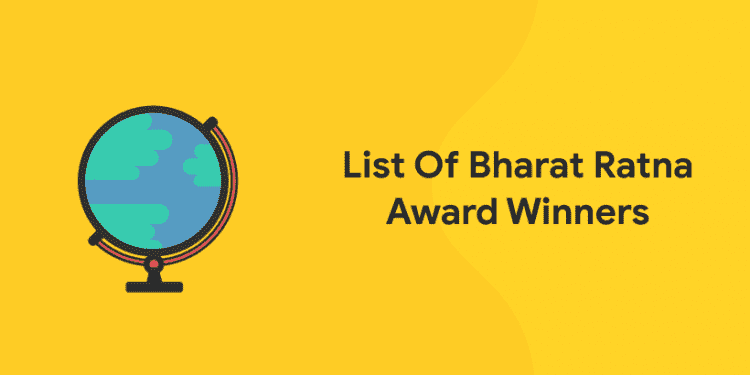The Bharat Ratna, which means the Jewel of India, is the highest civilian award of our country. It was established on 2 January 1954. The award is bestowed in recognition of exceptional service/performance of the highest order, without distinction of race, occupation, position, or sex. Originally, the award was limited to achievements in the field of arts, literature, science, and public services. In December 2011, the Government expanded the criteria to include “any field of human endeavor”. It is the Prime Minister who makes recommendations for the Bharat Ratna to the President. The recipients receive a Sanad (certificate) signed by the President and a peepal leaf-shaped medallion. No monetary grant is associated with the award. Bharat Ratna recipients are ranked seventh in the Indian order of precedence. Here are some facts on this award and the list of Bharat Ratna Award winners.
Facts about Bharat Ratna
First recipients of the award – C. Rajagopalachari (The last Governor-General of the Dominion of India), Sarvepalli Radhakrishnan (First Vice-President of India), C.V Raman (Nobel Prize winner, Physicist).
First individual to be awarded posthumously – Lal Bahadur Shastri.
Youngest recipient – Sachin Tendulkar (at the age of 40).
Oldest recipient – Dhondo Keshav Karve (at the age of 100).
First singer to receive Bharat Ratna – M. S. Subbulakshmi.
Naturalised citizen to receive the award – Mother Teresa
Non-Indians to receive the award – Abdul Ghaffar Khan, Nelson Mandela.
Recipients of 2019 – Nanaji Deshmukh (posthumously), Bhupen Hazarika (posthumously), former President of India, Pranab Mukherjee.
Download Entri! Crack Competitive Exams!
List of Bharat Ratna Award winners
Year |
Laureates |
State / Country |
Notes |
1954 |
C. Rajagopalachari |
Tamil Nadu |
Last Governor-General of independent India. |
Sarvepalli Radhakrishnan |
Tamil Nadu |
India’s first Vice-President and the second President. His birthday on 5 September is observed as “Teachers’ Day” in India |
|
C. V. Raman |
Tamil Nadu |
Nobel Prize winner, 1930. |
|
1955 |
Bhagwan Das |
Uttar Pradesh |
Independence activist, philosopher, and educationist. |
M. Visvesvaraya |
Karnataka |
His birthday, 15 September, is observed as “Engineer’s Day” in India. |
|
Jawaharlal Nehru |
Uttar Pradesh |
First and the longest-serving Prime Minister of India. |
|
1957 |
Govind Ballabh Pant |
Uttarakhand |
First Chief Minister of Uttar Pradesh |
1958 |
Dhondo Keshav Karve |
Maharashtra |
Known for his works related to woman education and remarriage of Hindu widows. Established the Widow Marriage Association, Hindu Widows Home, and started Shreemati Nathibai Damodar Thackersey Women’s University. |
1961 |
Bidhan Chandra Roy |
West Bengal |
Cconsidered as “Maker of Modern West Bengal” Second Chief Minister of West Bengal. His birthday, on 1 July, is observed as National Doctors’ Day in India. |
Purushottam Das Tandon |
Uttar Pradesh |
He was actively involved in the campaign to get official language status to Hindi. |
|
1962 |
Rajendra Prasad |
Bihar |
First President of India. |
1963 |
Zakir Husain |
Telangana |
Second Vice-President of India and became the third President of India. |
Pandurang Vaman Kane |
Maharashtra |
Indologist and Sanskrit scholar. |
|
1966 |
Lal Bahadur Shastri |
Uttar Pradesh |
Known for his slogan “Jai Jawan Jai Kisan”. Served as second Prime Minister of India and led the country during the Indo-Pakistani War of 1965. |
1971 |
Indira Gandhi |
Uttar Pradesh |
Known as the “Iron Lady of India”, she was the Prime Minister of India during 1966–77 and 1980–84. |
1975 |
V. V. Giri |
Odisha |
Fourth President of India. |
1976 |
K. Kamaraj |
Tamil Nadu |
Known as the “King Maker”. Chief Minister of Tamil Nadu during 1954–57, 1957–62, and 1962–63; and founder of Indian political party Indian National Congress (Organisation). |
1980 |
Mother Teresa |
West Bengal |
The founder of the Missionaries of Charity. She was awarded the Nobel Peace Prize for her humanitarian work in 1979. Was beatified on 19 October 2003 by Pope John Paul II and canonised on 4 September 2016 by Pope Francis. |
1983 |
Vinoba Bhave |
Maharashtra |
Was awarded the Ramon Magsaysay Award (1958) for his humanitarian work. |
1987 |
Abdul Ghaffar Khan |
Pakistan |
Known as “Frontier Gandhi”. |
1988 |
M. G. Ramachandran |
Tamil Nadu |
Known as the “Puratchi Thalaivar”. Actor turned politician. Was the first actor to become the chief minister of the state in the history of India. He was the Chief Minister of Tamil Nadu during 1977–80, 1980–84 and 1985–87; and founder of Indian political party All India Anna Dravida Munnetra Kazhagam. |
1990 |
B. R. Ambedkar |
Madhya Pradesh |
Was the Chief architect of the Indian Constitution and also served as the first Law Minister of India. |
Nelson Mandela |
South Africa |
Leader of the Anti-Apartheid Movement in South Africa, Mandela was the President of South Africa (1994–99). Often called as the “Gandhi of South Africa”. |
|
1991 |
Rajiv Gandhi |
Uttar Pradesh |
Sixth Prime Minister of India. |
Vallabhbhai Patel |
Gujarat |
Widely known as the “Iron Man of India”. Was an independence activist and first Deputy Prime Minister of India (1947–50). |
|
Morarji Desai |
Gujarat |
Fourth Prime Minister of India. He is the only Indian national to be awarded the Nishan-e-Pakistan, highest civilian award given by the Government of Pakistan. |
|
1992 |
Abul Kalam Azad |
West Bengal |
India’s first Minister of Education. He was widely known as “Maulana Azad”. His birthday on 11 November is observed as National Education Day in India. |
J. R. D. Tata |
Maharashtra |
Founded India’s first airline Air India. |
|
Satyajit Ray |
West Bengal |
In 1984, Ray was awarded the Dadasaheb Phalke Award, India’s highest award in cinema. |
|
1997 |
Aruna Asaf Ali |
Haryana |
Independence activist Ali is better known for hoisting the Indian flag in Bombay during the Quit India Movement in 1942. Post Independence, Ali was elected as Delhi’s first mayor in 1958. |
A. P. J. Abdul Kalam |
Tamil Nadu |
Served as the eleventh President of India from 2002 until 2007 |
|
1998 |
M. S. Subbulakshmi |
Tamil Nadu |
She is known for her divine voice & often hailed as “Queen of songs”, the first Indian musician to receive the Ramon Magsaysay award for her public service. |
Chidambaram Subramaniam |
Tamil Nadu |
Former Minister of Agriculture of India (1964–66). Subramaniam is known for his contribution towards Green Revolution in India. |
|
1999 |
Jayaprakash Narayan |
Bihar |
Commonly referred as “Loknayak”. |
Amartya Sen |
West Bengal |
Winner of the Nobel Memorial Prize in Economic Sciences (1998). |
|
Gopinath Bordoloi |
Assam |
Was the first Chief Minister of Assam (1946–50). |
|
Ravi Shankar |
Uttar Pradesh |
Winner of four Grammy Awards and often considered “the world’s best-known exponent of Hindustani classical music”. |
|
2001 |
Lata Mangeshkar |
Madhya Pradesh |
Credited as the “nightingale of India”. In 1989, Mangeshkar was awarded the Dadasaheb Phalke Award, India’s highest award in cinema. |
Bismillah Khan |
Bihar |
Hindustani classical shehnai player, Khan and is credited to have brought the instrument to the centre stage of Indian music |
|
2009 |
Bhimsen Joshi |
Karnataka |
Hindustani classical vocalist. Widely known for the Khyal genre of singing. |
2014 |
C. N. R. Rao |
Karnataka |
The recipient of Honorary Doctorates from 63 Universities. He has authored around 1600 research papers and 48 books. |
Sachin Tendulkar |
Maharashtra |
He holds various cricket records including the only player to have scored one hundred international centuries, the first batsman to score a double century in a One Day International and the only player to complete more than 30,000 runs in both ODI and Test cricket. |
|
2015 |
Madan Mohan Malaviya |
Uttar Pradesh |
Founder of Akhil Bharatiya Hindu Mahasabha and Banaras Hindu University. He was the President of Indian National Congress for four terms and was the Chairman of Hindustan Times from 1924 to 1946. |
Atal Bihari Vajpayee |
Madhya Pradesh |
Parliamentarian for over four decades, Vajpayee was elected nine times to the Lok Sabha, twice to the Rajya Sabha and served as the Prime Minister of India for three terms; 1996, 1998, 1999–2004. |
|
2019 |
Pranab Mukherjee |
West Bengal |
Served as the 13th President of India from 2012 until 2017. |
Bhupen Hazarika |
Assam |
Widely known as Sudhakantha. |
|
Nanaji Deshmukh |
Maharashtra |
Chandikadas Amritrao Deshmukh also known as Nanaji Deshmukh, was a social activist from India. He was a leader of the Bharatiya Jana Sangh and also a member of the Rajya Sabha. |
Want to clear the Government exams with flying colors? Team Entri is here to help you. We help you ace your preparations using mock tests, high quality contents and live classes. Study materials for all Governemnt , PSC and banking exams are provided. Make ample use of the fine resources from Entri and land your dream job. Good luck!













